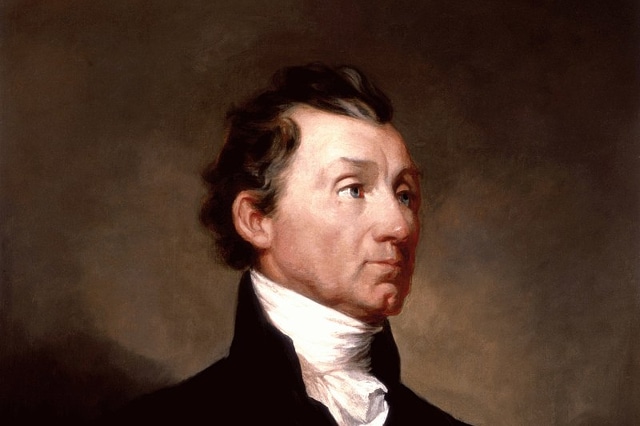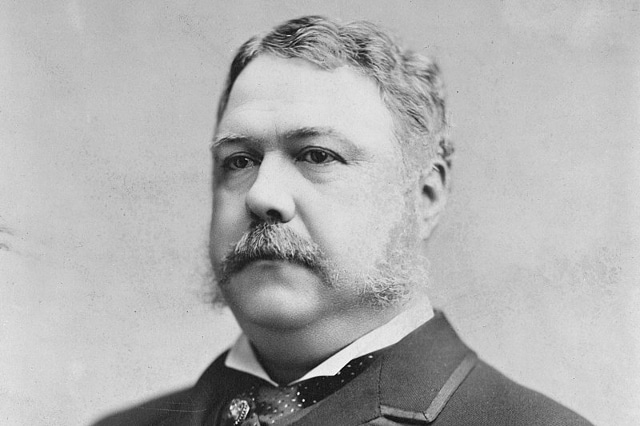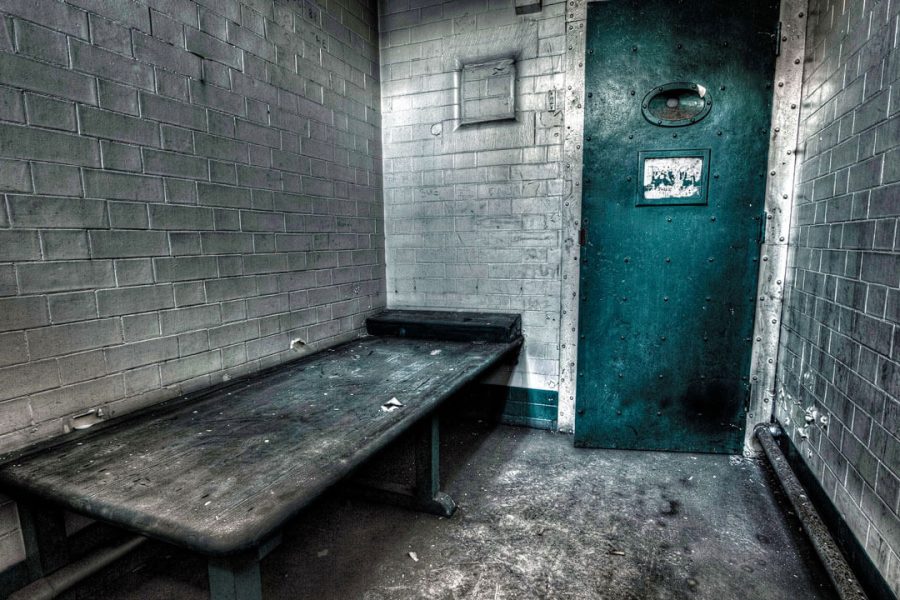Abraham Lincoln earned a reputation as a fair, honest, and ethical politician, which is why he was nicknamed Honest Abe. He was also called the Great Emancipator for his role in ending slavery. Another example: John F. Kennedy was known simply as JFK, after the initials of his name. It was simple, but instantly recognizable and memorable.
The thing is, even when you're the president of the United States, you're not always treated with the respect that comes with your position. Sure, some nicknames are meant to be fun, even affectionate, but many others are demeaning or just plain weird.
We've all heard of Tricky Dick and the Gipper, but here are the stories behind 10 other weird presidential nicknames.
10. The Last Cocked Hat

Fashion can be a fickle mistress, even when you're the commander in chief. That's the lesson James Monroe, the fifth president of the United States, learned when he became known as " The Last Cocked Hat ".
The nickname was a reference to Monroe's outdated fashion choices. Even though he was in power in the 1820s, he still dressed in the style common during the American Revolution: knee-length breeches, white powdered wigs, andcocked hat The presidents who followed him adopted more modern fashion choices, which is why Monroe was called "the last cocked hat."
The nickname followed him for the rest of his life, and while we don't know how Monroe felt about it, we can at least say that the nickname was still affectionate and was never intended to be used in a derogatory manner, which is definitely not the case with all the entries on this list. Speaking of which…
9. Dime Jimmy

"There's an old saying in Tennessee - I know there's one in Texas, maybe Tennessee - that goes: Fool me once, shame on you. Fool me - you won't be fooled anymore ".
This little gaffe by George W. Bush taught him that when you are the President of the United States, everything you say is scrutinized, and your political opponents are more than happy to criticize you every time you speak. This is especially true during elections, when one misstep can cost you the race, as James Buchanan nearly learned to his own detriment.
During the 1856 presidential election, Democratic candidate James Buchanan angered the working class when he said he believed ten cents a day represent a fair wage for workers. Republicans seized on the opportunity and derisively called Buchanan "Dime Jimmy " - a nickname that accompanied him at rallies throughout the election campaign.
This could have cost Buchanan the election, but he played the slavery card, arguing that each state should decide for itself whether to outlaw slavery, while his Republican opponent, John C. Fremont, wanted the practice abolished nationwide. This ensured Buchanan the Southern vote and won the election, despite his "Ten Cent Jimmy" gaffe.
8. Uncle Jumbo

There have been quite a few presidents who were known for their insatiable appetites and incredible heights. One of them was Grover Cleveland, the 22nd and 24th president of the United States, who is best remembered for being the only one in American history to serve two consecutive terms. In fact, weighing between 260 and 280 pounds during his political career, Cleveland was the second the hardest US president in history, second only to William Taft. (But more on him later.)
It's no wonder, then, that Cleveland has earned the nickname " Uncle Jumbo " However, it seems that this nickname at least arose from an affection that began with his nieces and nephews and then extended to his friends and family Cleveland adopted the name and used it to portray himself as a friendly and caring uncle, which resonated with voters and helped him get elected.
7. Human Iceberg

« Human Iceberg " sounds like a nickname you'd give to an NFL player or maybe a supervillain, but instead it went to the 23rd President of the United States, Benjamin Harrison.
Presumably, this nickname was related to his personal character, which was cold , quiet and stiff, which contrasted sharply with his lively and engaging public persona. Put Harrison in front of a crowd of 30,000 people and he would have no problem engaging and holding their attention, but put him in a room with a handful of people and he would struggle to string words together for more than two minutes.
Harrison's critics believed that the nickname "human iceberg" also suited his presidency, as he moved slowly through it without any notable events.
6. Big Lover

As we mentioned earlier, Grover Cleveland was the second heaviest president after William Howard Taft, who weighed up to 350 pounds during his time in office. Taft is now best known for being so fat that he once got stuck in a White House bathtub, although this story is likely an urban legend that doesn't really hold up to scrutiny.
However, it is true that Taft was once mocked for his size and appetite, and was often referred to as " Big Lab " While you could say it sounded no worse than "Uncle Jumbo," the difference was in the viciousness of the words. While "Uncle Jumbo" was a term of endearment for Cleveland in his family, " Big Lab " was a nickname Taft adopted during his school years and followed him throughout his life, even when he became President of the United States.
At least his wife Nellie had a more affectionate nickname for the portly president. She called him " sleeping Beauty " because Taft often fell asleep at parties.
5. Uncle Corn Pon

While we're on the subject of offensive nicknames, we should include " Uncle Corn Pone "," a nickname reserved for the 36th President of the United States, Lyndon B. Johnson. In this case, "cornbread" refers to a rural, unsophisticated person, thus mocking LBJ's southern roots, as he was born in Texas.
But what was most upsetting about the nickname was who came up with it: none other than Kennedy. While Johnson was vice president, JFK and his brothers mocked him by calling him either "Uncle Corn Pone" or "Rufus Corn Pone." But perhaps even more offensive was their name for LBJ's wife, Lady Bird Johnson, whom they called " small pork chop Uncle Corn Pon ".
4. The Madman of Massachusetts

Again, " The Madman of Massachusetts " sounds like a nickname you would use for someone entering the ring at WrestleMania, but instead it was the nickname given to the sixth President of the United States, John Quincy Adams.
What did Adams do that made him labeled a madman? Well, he dared to question the value of slavery. Adams initially believed that slavery was immoral but necessary to the continuation of the Union. As the years passed, he became a committed abolitionist who believed that either the South would abolish slavery or else there would be a civil war.
As you can imagine, such ideas made him many enemies, especially south of the Mason-Dixon line. He narrowly avoided a formal motion to censure him. anti-slavery agitation back in 1842, when he was still a member of the House of Representatives. He received many insults and even threats to his life for his actions, so in retrospect, the nickname "Madman" from Massachusetts " was far from the worst thing he had to endure.
3. Sphinx

Oddly enough, there have been two American presidents who have been called "The Sphinx." The first is pretty simple. Calvin Coolidge, the 30th president of the United States, was known as a man of few words, so he earned quite a few nicknames that referred to his taciturn demeanor — Silent Cal, Cautious Cal And , what's the strangest thing is, Potomac Sphinx. .
The story behind the second nickname is a little more interesting and concerns Franklin D. Roosevelt, the only American president to serve three terms, though he actually won four. The nickname actually refers to his third, elusive presidential term. In 1939, Roosevelt seemed ready to hang up his boots once his second term ended in 1940, following the presidential tradition of retiring after two stints as commander in chief. However, when World War II broke out, there was much speculation that Roosevelt might seek a third term to lead the country through the crisis.
On this issue, Roosevelt kept his cards close to his chest and said very little in the run-up to the election. This prompted several newspapers to publish cartoons depicting Roosevelt as the Great Sphinx of Giza, unwilling to share the answer to the "third term question" with anyone else.
Then, on the evening of December 9, 1939, Roosevelt attended the Gridiron Club's winter dinner as the guest of honor. It featured Washington journalists doing skits and ridiculing politicians, and the evening culminated in them making an 8-foot statue out of papier-mache with Roosevelt as the Sphinx. Franklin Roosevelt liked it so much that he asked to keep it after the night was over, and it still sits in a place of honor at the Franklin D. Roosevelt Presidential Library and Museum.
2. His Fraud, "Ruterfraud" B. Hayes

Here we have another doppelganger, except this time we use two nicknames for the same president, rather than the other way around.
When Rutherford B. Hayes became the 19th president of the United States, he did so under a cloud of controversy. The election of 1876 was fraught with controversy because Hayes's opponent, Samuel J. Tilden, actually won the popular vote. He also led in the popular vote, but in three states the race was so close that both parties claimed victory. Congress created a special commission to determine the winner, and they declared the election in Hayes's favor, 185 electoral votes to 184.
After Hayes took office, his most vocal critics accused him of imprisoning " corrupt deal " to win the presidential election and gave him two nicknames to remind him of his undeserved victory: "His Fraud" and " Rutherford B. Hayes."
1. President Dude

Without a doubt, the coolest presidential nickname belongs to Chester A. Arthur, who was known as " President Dude "It's a little strange, as someone who is constantly among the most forgotten presidents, received such a chic nickname, but it makes sense, since back then the word had a slightly different meaning.
Arthur didn't become known as "The Dude" because he put a rug in the Oval Office that really tied the room together. Instead, he got it because of his love of fashion, knick-knacks, and the finer things in life. Back then, "The Dude" basically meant " dandy " - a young man who is completely devoted to the latest styles and fads.
And Chester A. Arthur was one of those people. Stories about his expensive habits became common during his tenure. He spent more than $30,000 of the 1880s just to redecorate the White House and make it more glamorous for his parties. He had a wardrobe full of silk top hats, expensive clothes and shoes imported from Europe that would put any modern heiress or fashionista to shame.
Arthur wasn’t exactly a workaholic either. He was definitely a man who valued his free time. It’s no surprise that the nickname “dude” was used derogatorily in his day, but Arthur didn’t seem to mind too much because he understood the golden rule… “Dude lives.”














Оставить Комментарий